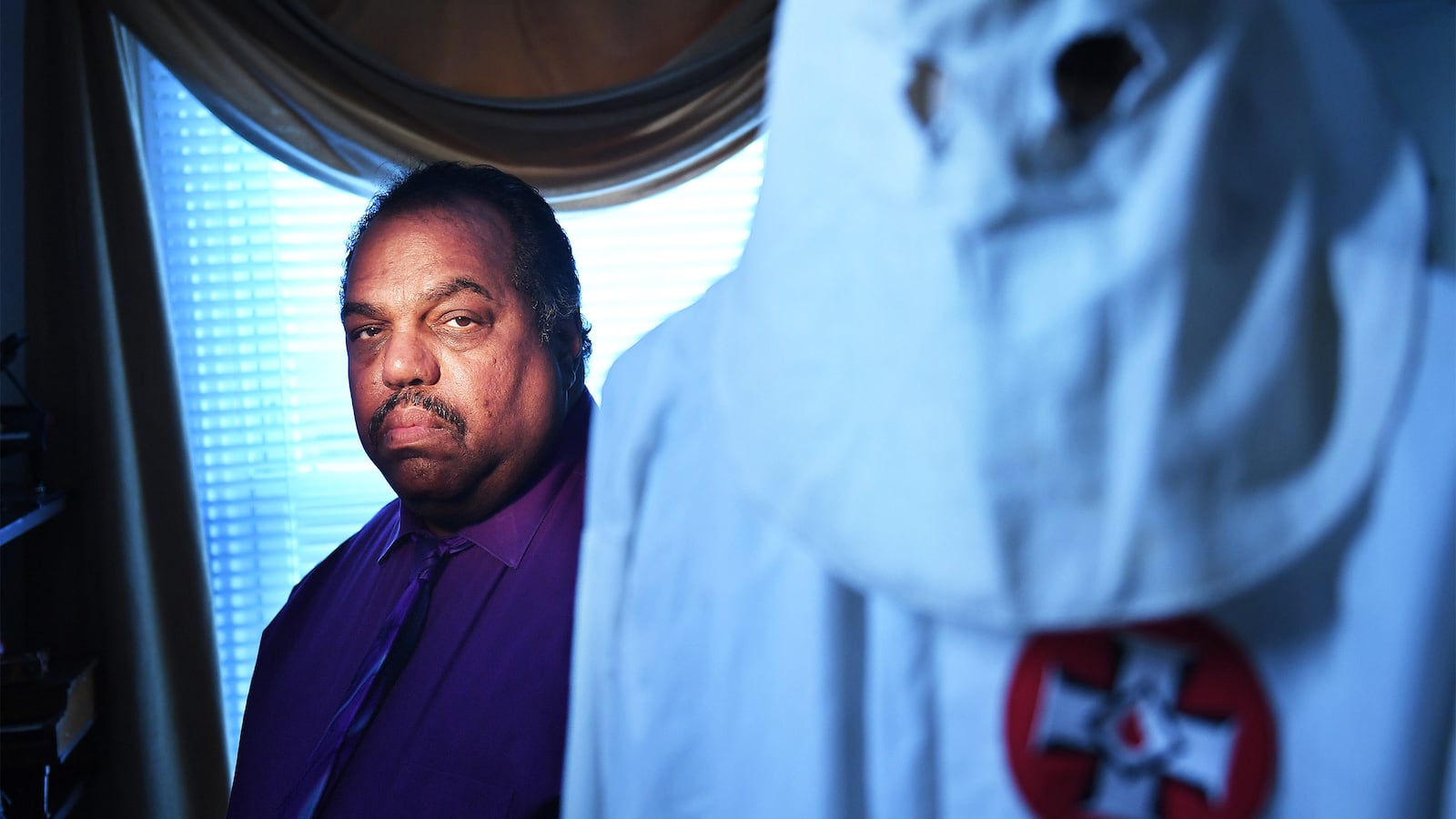Richard Wilson Preston Jr. is not a nice guy.
When the imperial wizard of the Confederate White Knights of the Ku Klux Klan came to the “Unite the Right” rally in Charlottesville, Virginia, a year ago, he was spoiling for a fight. “I will go out and shoot you,” he fumes in one video. “I’m pissed off,” he says in another. “I’m going to shoot one of these motherfuckers.” Not long after, spotting a black man wielding a small, makeshift flamethrower, he yells, “Hey, n****r,” pulls a Ruger SR9 pistol, and fires toward the man.
Preston is a birther who has called Barack Obama a “Muslim mongrel.” He once suggested that “every Muslim” should “burn in hell.” He says he was expelled from high school at 16 for getting into a fight with a black boy. He has allegedly failed to pay child support, and police were reportedly called to the Baltimore home he shares with his mother at least 19 times. He has been arrested for rape, assault and theft, although he was not convicted of any of those charges.
So it wasn’t much of a surprise when Charlottesville Circuit Court Judge Richard Moore sentenced him last week to eight years in prison—four of them suspended—for discharging a firearm within 1,000 feet of a school. Prosecutors had asked for that term, citing Preston’s lack of remorse, and Moore agreed, saying that the 53-year-old had acted out of pure “belligerence.”
But there’s one unusual man who sees things differently.
Daryl Davis is a black man who plays first-rate rhythm and blues piano, has acted on television and the stage, and for some 30 years has made it a mission to make friends with, and supposedly turn away from racism, hundreds of members of the Ku Klux Klan. Davis boasts frequently that over 200 men have left the Klan since becoming “friends” with him, and more than 40 of them, he says, gave him their own Klan robes on the way out.
Even so, it was a bit of a shock to see Davis come to Charlottesville to testify on Preston’s behalf at a preliminary hearing last December. He said that he’d known Preston for five years, and that he had put up part of Preston’s $52,000 cash bond. “I’m testifying because he’s my friend,” Davis said. “He’s in trouble and I’m trying to help.”
According to a story on Medium.com, a Klansman who also testified as a character witness for Preston posted after the December hearing that “[t]he ape was a witness [for] Richard and was willing to put up 25000.00 [sic] bucks for his bail. He said he’d take n****rs money and fuck him.”
In May, Preston pleaded no contest to the charges.
It wasn’t the first time Davis had taken such a stand. I know, in part, because I followed Davis’ career for many years as an official of the Southern Poverty Law Center. In fact, I appear as a mild critic of his in a 2016 documentary that aired on PBS, “Accidental Courtesy: Daryl Davis, Race & America.”
Davis is no Klansman—he couldn’t be, given his skin color. “When two enemies are talking, they’re not fighting,” he likes to say when explaining what he views as his personal crusade against racism. But when his many relationships with Klan leaders are examined, it’s hard not to wonder if he isn’t fundamentally aiding and abetting the cause he claims to oppose.
In 2004, Davis appeared at another hearing to testify on behalf of another hardline racial extremist—Chester Doles, the longtime Georgia unit leader for the National Alliance, which was for many years America’s most important neo-Nazi group. The group’s founding document calls for doing “whatever is necessary” to achieve “a White living space” through “the racial cleansing of the land.” “Ultimately,” Alliance founder William Pierce wrote elsewhere, “we will win the war only by killing our enemies.”
Doles was a former Klan leader who in 1993 had been sentenced to seven years in prison for attacking an interracial couple in Elkton, Maryland. Four years later, he pleaded guilty to burglary and was given probation. He has a swastika tattooed on one hand. The 2004 case in which Davis testified for Doles was the result of an FBI raid on Doles’ Georgia home that produced six charges of illegal weapons possession. A convicted felon, Doles was prohibited from owning firearms.
“Chester and I are true friends,” Davis told the judge. He said he’d interviewed Doles for his 1997 book, Klan-destine Relationships: A Black Man’s Odyssey in the Ku Klux Klan, and believed he posed no threat to society. Still, Doles pleaded guilty, and was sentenced to almost six years in prison.
And then there’s the case of Frank Ancona.
The “Accidental Courtesy” documentary opens and closes with Ancona, who was the imperial wizard of the Traditionalist American Knights of the Ku Klux Klan at the time. Davis is shown embracing Ancona and straightening his hood for him—the hood that Ancona claims represents the “head of a dove.” “I consider him to be a very good friend of mine,” Davis says in the film.
Ancona’s group was known for its thuggish threats. Most remarkable were the pamphlets it handed out in Ferguson, Missouri, after police there killed a black man, Michael Brown, in 2014. The pamphlets threatened to use “lethal force” against protesters.
At one point in the documentary, Ancona, an avowed enemy of “race-mixing,” presents a “Certificate of Friendship” to Davis “in recognition of his friendship and contributions to the Traditionalist American Knights of the Ku Klux Klan and demonstrating true friendship.” Davis comments that he thinks Ancona will one day leave the Klan. Instead, as the film notes in its postscript, Ancona was murdered in 2017, two days before it aired on PBS. His wife and stepson were charged with his death.
In Charlottesville, Davis accompanied another Klan leader—Billy Snuffer, imperial wizard of the Rebel Brigade Knights of the Ku Klux Klan—to Preston’s December hearing. On the way, he was confronted by an outraged black woman who yelled at him to “get the fuck out of Charlottesville.” Undaunted, Davis lauds his own work in a TV news story about his trip. “They’re done, they’re done,” he says of the many Klansmen he claims to have befriended. “As a result of meeting me and having these conversations, not overnight, but over time,” he adds.
Davis also took Preston, shortly before his sentencing, to visit the National Museum of African American History and Culture in Washington, D.C. The idea was to teach him about black history. But Preston didn’t seem that interested, and wore a Confederate flag bandana on his head the whole time, shocking museum visitors. Asked about it by CNN, Preston said the flag is “just a piece of history.”
Shortly after that, Davis accepted Preston’s invitation to give away his bride-to-be, in the absence of her ailing father, at Preston’s wedding. Davis was photographed arm-in-arm with Preston’s bride, standing outside the house where the wedding took place with a Confederate battle flag directly overhead.
Daryl Davis is not an enthusiast of the Klan or its ideology. He tries to challenge Klansmen’s racist beliefs but without antagonizing them. “They are human beings,” he told The Washington Post shortly after the 2017 Charlottesville rally, where a woman was run down and killed by a neo-Nazi. “Many are good, hard-working people with a skewed perception of life and reality.”
But not very many anti-racists agree.
In “Accidental Courtesy,” Baltimore activist Kwame Rose angrily tells Davis to “stop wasting your time” with white supremacists: “We do not need to give ammunition to anyone to celebrate their racist past.” An NAACP official has also criticized Davis. In Charlottesville, while he was accompanying Klan leader Billy Snuffer, the confrontation with a black woman escalated to the point where police arrived to separate Snuffer and Davis from a growing crowd. A number of critics also have pointed to claims Davis made about eradicating the Klan in the state of Maryland—something that was untrue then and remains so today.
The much-discussed “conversation about race” is certainly something the United States needs as it continues to wrestle with its ancient demons and the original sin of slavery. But a black man who hugs Klansmen, goes to their weddings, listens to their racist jokes and even testifies in court to help them avoid prison time, may be more of a balm than an antidote to the scourge of hate.
Mark Potok is a Senior Fellow at the Centre for Analysis of the Radical Right and a longtime former Senior Fellow at the Southern Poverty Law Center.





